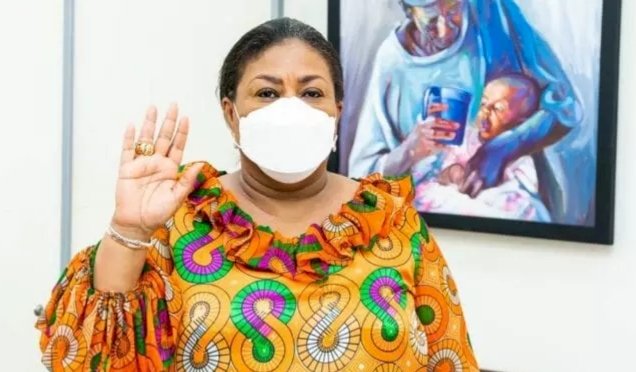Pragmatic Measures Needed To Close Inequalities In Ghana - First Lady

The First Lady of Ghana, Rebecca Akufo Addo has said the coronavirus pandemic is known to affect everyone everywhere, but also impacts different groups of people differently deepening existing inequalities. To that end, she said, We must all therefore join efforts to adopt pragmatic measures to help close these inequalities. This, she said is important because even though earlier
data indicated that the mortality rates from COVID-19 may be higher for men other reports say the pandemic is having devastating social and economic consequences on more women and girls. This is because nearly 60 per cent of women work in the informal economy, earning less, saving less, and at greater risk of falling into poverty. She added Again, as
markets fall and businesses close, evidence abounds that millions of women’s jobs are disappearing, while most of them continue to lose paid employment, forcing them to engage in unpaid care work due to the exigencies of the times, including school closures and the increased care for the aged. The First Lady said these in a statement to mark the International Women’s
Day on Monday March 8. It is worth mentioning that apart from Ghana, and the other countries, whose male presidents have been praised for controlling and managing the pandemic with strategic interventions and policies, majority of the countries that have been successful in stemming the tide are said to be headed by women. We, therefore, salute the leaders of Ethiopia,
New Zealand, Germany, Finland, Denmark, Slovakia and the others, for making us proud. They have demonstrated that despite the new barriers brought by the pandemic to compound the pre-existing social and systemic challenges that women face in their bid to participate in the leadership arena, working together around the campaign theme: #ChooseToChallenge,
would help in changing the status quo of biases and stereotyping that impede achieving gender equality. The UN cautions that the multiple obstacles that remain unchanged - the devaluation of women and girls in some societies, the fewer choices, and experiences of all forms of violence, especially around the COVID-19 period, are threatening hard-won gains. For instance, global statistics, as of 2019, indicated that legal
restrictions had kept 2.7 billion women from accessing the same choice of jobs as men, while less than 25 per cent of parliamentarians were women. It is so imperative that women from all walks of life heed the clarion call to continually support women’s tireless efforts at bringing different expertise, experiences, perspectives and skills to the table, and make concrete contributions to decisions, policies and laws that work better for all.







